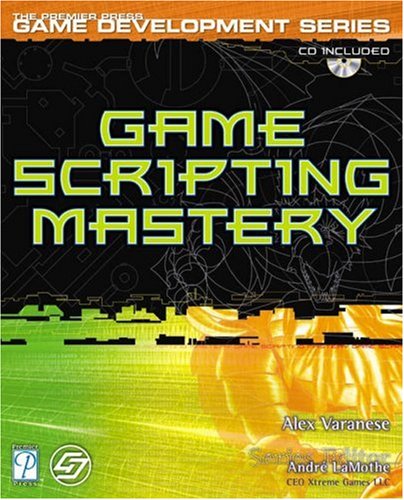

Most ebook files are in PDF format, so you can easily read them using various software such as Foxit Reader or directly on the Google Chrome browser.
Some ebook files are released by publishers in other formats such as .awz, .mobi, .epub, .fb2, etc. You may need to install specific software to read these formats on mobile/PC, such as Calibre.
Please read the tutorial at this link. https://ebooknice.com/page/post?id=faq
We offer FREE conversion to the popular formats you request; however, this may take some time. Therefore, right after payment, please email us, and we will try to provide the service as quickly as possible.
For some exceptional file formats or broken links (if any), please refrain from opening any disputes. Instead, email us first, and we will try to assist within a maximum of 6 hours.
EbookNice Team

Status:
Available0.0
0 reviews
ISBN 10: 1931841578
ISBN 13: 9780585449913
Author: Alex Varanese
Part I: Scripting Basics
Chapter 1: Introducing Game Scripting
What Is Game Scripting?
Why Scripting?
The Role of the Scripting System
Scripting vs. Hardcoding
Scripting Languages vs. Programming Languages
Common Scripting Language Features
How Scripting Fits into Game Development
The Grand Finale: The XtremeScript Engine
Chapter 2: Variables and Data Types
What Are Variables?
Data Types
Common Variable Operations
Variable Scope
Casting and Type Conversion
Arrays
User-Defined Types
Chapter 3: Conditional Logic
Conditional Expressions
Chapter 4: Loop Structures
Looping Concepts
Nested Loops
Loop Control Statements
Chapter 5: Functions and the Run-Time Stack
What Are Functions?
Declaring and Defining Functions
Calling Functions
Parameters
Return Values
Function Overloading
Recursion
The Run-Time Stack
Part II: Building a Scripting System
Chapter 6: Understanding the Virtual Machine
The Game Engine
The High-Level Language
The Assembly Language
The Virtual Machine
The Assembler
The Compiler
Chapter 7: The Virtual Machine: The Instruction Set
Machine Code Basics
Instruction Set Design
The XVM Instruction Set
Opcode Structure
Operands and Addressing Modes
Chapter 8: The Virtual Machine: Core Architecture and Implementation
The XVM Architecture
Memory Organization
The Program Counter
The Stack Pointer
Registers
The Virtual Machine Loop
Implementing the XVM
Chapter 9: The Virtual Machine: Function Calls
Call Frame Layout
The Call Instructio
Parameter Passing
Implementing XVM Function Calls
Chapter 10: The Assembler
The Assembler's Role
The Two-Pass Approach
Lexical Analysis (Tokenizing)
Syntactic Analysis (Parsing)
Symbol Tables
Code Generation
Implementing the XVM Assembler
Part III: Compiling a Scripting Language
Chapter 11: The Compiler: Lexical Analysis
The Compiler's Role
Lexical Analysis Explained
Implementing a Lexer
Tokens and Lexemes
Finite Automata
Chapter 12: The Compiler: Syntactic Analysis
Syntactic Analysis Explained
Context-Free Grammars
Parse Trees
Recursive-Descent Parsers
Abstract Syntax Trees (ASTs)
Implementing the Parser
Chapter 13: The Compiler: Intermediate Code Generation
Intermediate Representations
Generating Code for Expressions
Generating Code for Statements
Control Flow Structures
Function Calls
Implementing Code Generation
Chapter 14: Integrating the Scripting System
Embedding the VM
Exposing the Host API
Calling Scripts from C++
Calling Host API Functions from Scripts
Debugging Considerations
Error Handling
Chapter 15: Advanced Scripting Topics
Object-Oriented Scripting
Garbage Collection
Just-In-Time (JIT) Compilation
Multi-threading
Scripting for Multiplayer Games
Visual Scripting
Optimization Techniques
Chapter 16: Putting It All Together: A Simple Game Example
Game Design
Scripting the Game Logic
Connecting Scripts to the Game Engine
Testing and Debugging
mastery assignment
the game master book 3
game master book pdf
game master book 3
game script book
mastery game
Tags: Alex Varanese, Game, Scripting